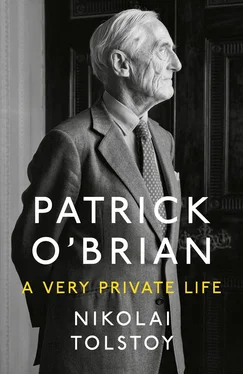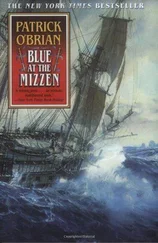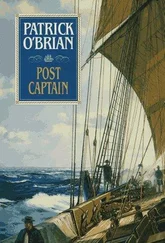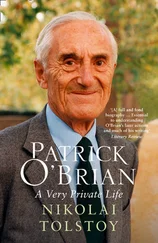Voyages of Adventure IV Voyages of Adventure V In the Doldrums VI A Family Man VII Master and Commander VIII The Green Isle Calls IX Pablo Ruiz Picasso X Shifting Currents XI Muddied Waters XII Travails of Existence XIII Family Travails XIV The Sunlit Uplands XV Epinician Acclaims XVI Triumph and Tragedy XVII Melmoth the Wanderer Envoi Appendix A: Collioure: History and Landscape Appendix B: Patrick and His First Wife Elizabeth Appendix C: Patrick’s Sailing Footnotes Notes Index Acknowledgements About the Author Also by Nikolai Tolstoy About the Publisher
From tho yles that I haue spoken of before in the lond of Prestre Iohn, that ben vnder erthe as to vs that ben o this half, and of other yles that ben more furthere beyonde, whoso wil pursuen hem for to comen ayen right to the parties that he cam fro and so enviroune alle erthe; but what for the yles, what for the see, and for what strong rowynge, fewe folk assayen for to passen that passage, all be it that men myghte don it wel that myght ben of power to dresse him thereto, as I haue seyd you before. And therfore men returnen from tho yles aboueseyd be other yles costyng fro the lond of Prestre Iohn.
M.C. Seymour (ed.), Mandeville’s Travels (Oxford, 1967), p. 223
By 1954 Patrick’s inspiration appeared to be flagging. Many authors will recognize the symptoms, when we find him turning to revisiting old notes and uncompleted earlier ventures. Among the latter was a novel for boys, which he felt might prove worth reviving. On 15 December 1945, not long after their arrival in Wales, he wrote in his journal:
I have just re-read that Samarcand tale. It is better than I had supposed, and it is well worth finishing. Suffers from want of central plot. It is hardly more than a series of incidents, more or less probable, fortuitously connected. M. is typing the rehashed novel. I hope it may not prove a disappointment, but it was poor stuff to begin with.
This indicates that the manuscript was among those efforts which he wrote in a flurry of creativity just before war broke out. However, the debilitating attack of writer’s block which assailed him during their four years’ stay in Wales obstructed any further endeavour in that direction, and eventually he found himself unable to progress beyond chapter six. [1] Конец ознакомительного фрагмента. Текст предоставлен ООО «ЛитРес». Прочитайте эту книгу целиком, купив полную легальную версию на ЛитРес. Безопасно оплатить книгу можно банковской картой Visa, MasterCard, Maestro, со счета мобильного телефона, с платежного терминала, в салоне МТС или Связной, через PayPal, WebMoney, Яндекс.Деньги, QIWI Кошелек, бонусными картами или другим удобным Вам способом.
Under pressure, he tended to look back to those exhilarating pre-war days, when inspiration apparently flowed unhampered by doubts. In November 1952 my mother observed that Patrick was ‘thinking of Samarkand’. Once again, nothing came of it, and a further year passed by when ‘P. took out Samarcand & looked at it.’ This time he experienced a sudden flow of inspiration, and on 26 January 1954 ‘P. did 2000 words of S.’ He was sufficiently pleased with his progress to write next day to his literary agent Naomi Burton at Curtis Brown in New York, enquiring whether Harcourt Brace might take the completed work.
By the beginning of February 1954 the book was well under way, when Naomi responded to my mother with a ‘fine misunderstanding about me leaving P[atrick]., & she says send Samarcand to her’. This appeared encouraging, so far as it went, and Patrick raced ahead to the conclusion. Ten days later he came to bed at 1.30 in the morning, ‘having finished Samarcand. He could not sleep, & looks so poorly today. S. posted …’
They had sent their sole typescript of the text, and an agonizing wait culminated on 24 April with a letter from Naomi containing the dispiriting news that Harcourt Brace was not interested. The precious typescript itself did not return until 6 May, when they forwarded it to Spencer Curtis Brown in London. Their relief and excitement may be imagined when, on 17 June, they learned that the publishers Rupert Hart-Davis were ‘“very enthusiastic” about dear Samarcand & suggest £100 advance’. On 24 June a contract was signed for ‘a Juvenile work by the Proprietor at present entitled “THE ROAD TO SAMARCAND”’, with the advance payable in successive tranches of £50 on delivery and £50 on publication.
The money was welcome (though as ever slow to arrive), and high hopes were pinned on the novel’s success. However, when The Road to Samarcand was published in February 1955, the outcome proved disappointing. Reviews were sparse and varied. While the naval historian Oliver Warner gave it a cautious thumbs up in Time and Tide , the Times Literary Supplement ’s anonymous reviewer tartly derided its conclusion – ‘as absurd politically as it is geographically’. The criticism may have been directed against the protagonists’ dramatic escape from Tibet in a Russian helicopter, discovered intact in a snowdrift. The story comprises many exciting adventures, of a character familiar to readers of early boys’ journals such as Boys’ Own Paper and Chums , wherein a daring English lad, customarily accompanied by an excitable Irishman and laconic Scot, survives a succession of hair’s-breadth perils at the hands of sinister foreigners. Patrick’s contribution to the latter is an evil Bolshevik agent named Dimitri Mihailovitch, who has his neck deservedly broken by the youthful hero’s uncle Sullivan. Evidently Patrick could not resist according this scoundrel my unfortunate father’s Christian name and patronymic!
The pre-war genesis of The Road to Samarcand represented a throwback to Patrick’s earlier success with children’s stories. However, while Caesar and Hussein were delightful original creations, it is hard not to concede that Samarcand represents something of a pastiche of the boys’ books that he loved during his lonely and imaginative childhood. [fn1] Конец ознакомительного фрагмента. Текст предоставлен ООО «ЛитРес». Прочитайте эту книгу целиком, купив полную легальную версию на ЛитРес. Безопасно оплатить книгу можно банковской картой Visa, MasterCard, Maestro, со счета мобильного телефона, с платежного терминала, в салоне МТС или Связной, через PayPal, WebMoney, Яндекс.Деньги, QIWI Кошелек, бонусными картами или другим удобным Вам способом.
Derrick, the boy hero of Samarcand , is an orphan assigned to the custody of his uncle Terry Sullivan, master of the schooner Wanderer plying the China Sea. Sullivan and his Scottish companion Ross are the protagonists of Patrick’s three immediately preceding published short stories, the third of which (‘No Pirates Nowadays’) is effectively prefatory to the events recounted in the novel. [fn2] Конец ознакомительного фрагмента. Текст предоставлен ООО «ЛитРес». Прочитайте эту книгу целиком, купив полную легальную версию на ЛитРес. Безопасно оплатить книгу можно банковской картой Visa, MasterCard, Maestro, со счета мобильного телефона, с платежного терминала, в салоне МТС или Связной, через PayPal, WebMoney, Яндекс.Деньги, QIWI Кошелек, бонусными картами или другим удобным Вам способом.
The crew includes a comical Chinese cook Li Han, whose exotic English provides a lively source of humour. Together with the eccentric and resourceful archaeologist Professor Ayrton, the friends survive perilous adventures in China and Tibet, battling Chinese warlords and Bolshevik agents, eventually coming through against all odds and acquiring the customary treasure.
Читать дальше












